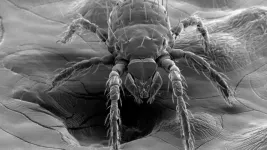(Press-News.org) Psychedelic-based therapies are poised to change the treatments that psychiatrists can offer patients.
“I often talk about psychedelic treatments as catalysts for change, for both the individual and the field of psychiatry,” said Medical University of South Carolina psychiatrist Jennifer Jones, M.D., who conducts research on these treatments.
The highly anticipated approval of MDMA, or “ecstasy,” to treat post-traumatic stress disorder would be the first for a psychedelic drug, ushering in changes for patients, mental health providers and society. The Food and Drug Administration is expected to issue a decision on MDMA-assisted therapy for PTSD in early 2024.
How well this revolutionary research will be implemented into practice will depend on patients’ willingness to undergo psychedelic-based treatments and their ability to access those treatments, said Jones. Jones’ latest research, published in Frontiers in Psychiatry, examines these potential barriers in a population that stands to benefit greatly from psychedelic therapies for PTSD: individuals that use substances.
Changing treatments and outcomes
Approval of psychedelic therapies could help patients with mental illnesses, particularly those with multiple or treatment-resistant disorders. PTSD is an often severe mental disorder that can occur after being exposed to a traumatic event. Current treatments, while improving symptoms in some patients, leave many without any benefit at all.
For the many people who have PTSD and habitually use alcohol or other substances, rates of nonresponse to treatment are even higher. Jones thinks this is unacceptable, so she started researching new approaches to treat patients with both PTSD and a substance use disorder.
A promising ‘new’ treatment option for patients with both PTSD and SUD may come from an ‘old’ group of drugs called psychedelics. Psychedelics include both natural (psilocybin, mescaline, DMT) and synthetic (LSD, MDMA) drugs. Natural psychedelics have been used medicinally and spiritually in traditional cultures for centuries. However, they were described scientifically mostly in the 1950s and 1960s.
“It is really interesting – in these early studies looking at psychedelic therapy for one indication, like PTSD, they noticed improvements in symptoms of another mental health disorder, like depression or SUD,” said Jones.
Since 2009, approximately 80 clinical trials involving MDMA have been completed or are ongoing, according to Clinicaltrials.gov. These trials investigate the use of MDMA in a wide range of disorders, including anxiety, depression, obsessive compulsive disorder, SUD and PTSD. These diverse studies highlight the potential effects of MDMA across multiple disorders, something that prior treatments have lacked.
“This is really important,” said Jones. “It is very common to have concurrent mental health disorders, so having a treatment like MDMA that could, for example, improve both PTSD and SUD symptoms is really exciting for the field.”
Currently, drugs used to treat PTSD may be given with or without another form of therapy, broadly referred to as “talk therapy.” For MDMA-assisted therapy, the talk therapy component is a fundamental part of the treatment.
“In the context of MDMA-assisted therapy for PTSD, MDMA is thought to dampen the fear response around the traumatic memory, allowing the participant to engage with the therapy team to process this memory, sometimes for the first time in their lives,” said Jones. “Instead of running from it, they can process the traumatic memory and move past it.”
This processing may also apply to other mental functions, perhaps accounting for MDMA’s ability to improve symptoms for other disorders, like SUD.
“Participants in psychedelic clinical trials have lasting benefits that come from changes in their behaviors, their thought processes and their interactions with others,” said Jones. “Participants often point to these changes as what made the difference in their symptoms.”
The immediate effects of MDMA during therapy are not without concern, however. Jones is often asked whether the MDMA will produce feelings of “ecstasy.” “Ecstasy is a common descriptor for the effects caused by recreational MDMA, used so frequently that it became a nickname for the drug. However, because this therapy is a difficult process of self-healing, MDMA in this context does not usually produce ecstasy, Jones said. This common concern points to some of the possible barriers that Jones wanted to assess in her recent publication.
Changing minds
For some, reluctance to receive MDMA-assisted therapy is tied to negative views of psychedelics and their recreational uses. In the 1970s, all psychedelics were classified as Schedule I substances, drugs with high-abuse potential without clinical benefits, tarnishing political and public perceptions of these drugs. Their recreational use and representations in media have continued to perpetuate this stigma.
Negative views of psychedelics and increasing regulatory control halted early promising research on psychedelics in Western medicine in the 1970s, reported the Multidisciplinary Association for Psychedelic Studies. It wasn’t until the 1990s that officially sanctioned psychedelic research resumed on a small scale, only accelerating in the 2010s. New government policies allowed psychedelic clinical research to resume, but public perceptions of psychedelics will determine the success of these drugs as treatments.
In Jones’ study, approximately 70% of survey respondents indicated their support for MDMA-based research and belief that MDMA could be useful for treating mental health disorders. A smaller group, 59%, would be willing to receive an MDMA-based treatment if it were recommended by a mental health provider. The survey results suggest that most people who use substances are open to MDMA research and would be willing to try an MDMA-based therapy.
Jones also examined the role of race and ethnicity on opinions about MDMA-assisted therapy. Despite their underrepresentation in psychedelic clinical trials, racial and ethnic groups had similar levels of support for MDMA research. However, there were small, but potentially important, differences in willingness to try an MDMA-based therapy. “While largely a hypothesis,” said Jones, “differences in willingness to participate in clinical trials are probably related to prior use or cultural beliefs.”
While this research brings up additional questions for Jones and colleagues, she believes these results can help researchers and mental health providers to understand how to develop and implement treatments more equitably for different patient and ethnic populations.
By discussing these issues prior to the FDA decision, Jones hopes steps can be taken to address patient concerns.
“It is my heartfelt goal that everyone who might benefit from MDMA-assisted therapy is able to receive treatment once it is available, and that they will not be held back by worries or stigma about the treatment,” said Jones. “For that to be a reality, we have to seek input directly from those most likely to benefit from the treatments that we are developing.”
# # #
About MUSC
Founded in 1824 in Charleston, MUSC is the state’s only comprehensive academic health system, with a unique mission to preserve and optimize human life in South Carolina through education, research and patient care. Each year, MUSC educates more than 3,200 students in six colleges – Dental Medicine, Graduate Studies, Health Professions, Medicine, Nursing and Pharmacy – and trains more than 900 residents and fellows in its health system. MUSC brought in more than $298 million in research funds in fiscal year 2022, leading the state overall in research funding. MUSC also leads the state in federal and National Institutes of Health funding, with more than $220 million. For information on academic programs, visit musc.edu.
As the health care system of the Medical University of South Carolina, MUSC Health is dedicated to delivering the highest-quality and safest patient care while educating and training generations of outstanding health care providers and leaders to serve the people of South Carolina and beyond. Patient care is provided at 16 hospitals (includes owned and equity stake), with approximately 2,700 beds and four additional hospital locations in development; more than 350 telehealth sites and connectivity to patients’ homes; and nearly 750 care locations situated in all regions of South Carolina. In 2022, for the eighth consecutive year, U.S. News & World Report named MUSC Health University Medical Center in Charleston the No. 1 hospital in South Carolina. To learn more about clinical patient services, visit muschealth.org.
MUSC has a total enterprise annual operating budget of $5.1 billion. The nearly 26,000 MUSC family members include world-class faculty, physicians, specialty providers, scientists, students, affiliates and care team members who deliver groundbreaking education, research, and patient
END
Psychedelic-assisted therapies for patients with PTSD
The resurgence of research into psychedelic-based treatments is poised to benefit many people who face mental health challenges, such as post-traumatic stress disorder, but how do they feel about it?
2023-07-12
ELSE PRESS RELEASES FROM THIS DATE:
Mass General Cancer Center researchers pinpoint protein tied to drug resistance in patients with lung cancer
2023-07-12
Cancer therapies that target specific genetic abnormalities in tumors have revolutionized treatment possibilities over the past two decades. While quality of life and survival are improved with targeted therapies, relapse is common due to the evolution of new tumor cells that are resistant to the targeted therapy. A new study by investigators from the Mass General Cancer Center, a member of the Mass General Brigham healthcare system, reveals how lung tumors may develop drug resistance over time, pointing to a protein, called APOBEC3A, that could be a promising target. Results, published in Nature, may help researchers develop new ...
Could drops replace eye injections for retina disease?
2023-07-12
NEW YORK, NY-- A new study suggests that eye drops developed by Columbia University researchers could be a more effective–and comfortable–therapy for a common eye disease currently treated with injections into the eye.
Retinal vein occlusion (RVO), an eye disease that affects up to 2% of people over age 40, occurs when a vein in the eye’s retina becomes blocked, leading to swelling in the eye, inflammation, damage to the retina, and vision loss.
Standard therapy involves injecting into the eye a vascular endothelial growth factor inhibitor (anti-VEGF) that reduces swelling. ...
New radar technique lets scientists probe invisible ice sheet region on Earth and icy worlds
2023-07-12
Scientists at the University of Texas Institute for Geophysics (UTIG) have developed a radar technique that lets them image hidden features within the upper few feet of ice sheets. The researchers behind the technique said that it can be used to investigate melting glaciers on Earth as well as detect potentially habitable environments on Jupiter’s moon Europa.
The near-surface layers of ice sheets are difficult to study with airborne or satellite ice-penetrating radar because much of what’s scientifically important happens too close to the surface to be accurately imaged. ...
How the immune system can alter our behavior
2023-07-12
New Haven, Conn. — Simply the smell of seafood can make those with an allergy to it violently ill — and therefore more likely to avoid it. The same avoidance behavior is exhibited by people who develop food poisoning after eating a certain meal.
Scientists have long known that the immune system played a key role in our reactions to allergens and pathogens in the environment, but it was unclear whether it played any role in prompting these types of behaviors towards allergic triggers.
According to Yale-led research published July ...
Warmer ocean temperatures increase risk of salmon bycatch in Pacific hake fishery
2023-07-12
NEWPORT, Ore. – Rates of Chinook salmon bycatch in the Pacific hake fishery rise during years when ocean temperatures are warmer, a signal that climate change and increased frequency of marine heatwaves could lead to higher bycatch rates, new research indicates.
During years when sea surface temperatures were higher, including during a marine heatwave, Chinook salmon were more likely to overlap with the Pacific hake and raise the risk of bycatch as they sought refuge from higher temperatures.
The findings, based on ...
Bacterium associated with disease found in NC chiggers
2023-07-12
July 12, 2023
Bacterium Associated With Disease Found in N.C. Chiggers
EMBARGOED FOR RELEASE UNTIL NOON EDT ON WEDNESDAY, JULY 12
A bacterium that causes a disease called scrub typhus – a disease not previously reported in the United States – has been detected in North Carolina, according to a new study by researchers at North Carolina State University and UNC-Greensboro.
The researchers stress that scrub typhus, which can cause fever, headache and body aches – and can be fatal if left untreated by antibiotics – has not yet been ...
Mass General Brigham researchers make key improvements to Parkinson’s disease cell therapies
2023-07-12
Researchers at McLean and Mass General Hospital demonstrated that a transplant surgical procedure (called “needle trauma”) triggers a profound immune response and causes the death of most grafted dopamine neurons
They also found that co-transplantation of neuronal cell therapy with host regulatory T cells resulted in effective suppression of needle trauma and significant improvement in the survival and recovery of grafts
Findings suggest a path for the ‘realistic’ use of cell therapy to treat neurodegenerative disorders
Cell therapy holds promise as a new treatment for Parkinson’s disease but, in many trials to date, most transplanted dopamine ...
County-level income inequality, social mobility, and deaths of despair in the US
2023-07-12
About The Study: This study found that the joint exposure of unequal income distribution and lack of social mobility was associated with additional risks for deaths of despair (deaths from suicide, drug overdose, and alcohol-related liver disease), suggesting that addressing the underlying social and economic conditions is crucial in responding to the epidemic of deaths of despair.
Authors: Chun-Tung Kuo, Ph.D., of National Taiwan University in Taipei, is the corresponding author.
To access the embargoed study: Visit our ...
Trends in acute care use for mental health conditions among youth during pandemic
2023-07-12
About The Study: Into the second year of the pandemic, mental health emergency department visits increased notably among adolescent females, and there was an increase in prolonged boarding (waiting in an emergency department or medical inpatient unit) of youth awaiting inpatient psychiatric care. Interventions are needed to increase inpatient child psychiatry capacity and reduce strain on the acute mental health care system.
Authors: Haiden A. Huskamp, Ph.D., of Harvard Medical School in Boston, is the corresponding author.
To access the embargoed study: Visit our For The Media website at this link https://media.jamanetwork.com/
(10.1001/jamapsychiatry.2023.2195)
Editor’s ...
Study: The ocean’s color is changing as a consequence of climate change
2023-07-12
CAMBRIDGE, MA -- The ocean’s color has changed significantly over the last 20 years, and the global trend is likely a consequence of human-induced climate change, report scientists at MIT, the National Oceanography Center in the U.K., and elsewhere.
In a study appearing today in Nature, the team writes that they have detected changes in ocean color over the past two decades that cannot be explained by natural, year-to-year variability alone. These color shifts, though subtle to the human eye, have occurred over 56 percent of the world’s oceans — an expanse that is larger than ...
LAST 30 PRESS RELEASES:
Why does chronic back pain make everyday sounds feel harsher? Brain imaging study points to a treatable cause
Video messaging effectiveness depends on quality of streaming experience, research shows
Introducing the “bloom” cycle, or why plants are not stupid
The Lancet Oncology: Breast cancer remains the most common cancer among women worldwide, with annual cases expected to reach over 3.5 million by 2050
Improve education and transitional support for autistic people to prevent death by suicide, say experts
GLP-1 drugs like Ozempic could cut risk of major heart complications after heart attack, study finds
Study finds Earth may have twice as many vertebrate species as previously thought
NYU Langone orthopedic surgeons present latest clinical findings and research at AAOS 2026
New journal highlights how artificial intelligence can help solve global environmental crises
Study identifies three diverging global AI pathways shaping the future of technology and governance
Machine learning advances non targeted detection of environmental pollutants
ACP advises all adults 75 or older get a protein subunit RSV vaccine
New study finds earliest evidence of big land predators hunting plant-eaters
Newer groundwater associated with higher risk of Parkinson’s disease
New study identifies growth hormone receptor as possible target to improve lung cancer treatment
Routine helps children adjust to school, but harsh parenting may undo benefits
IEEE honors Pitt’s Fang Peng with medal in power engineering
SwRI and the NPSS Consortium release new version of NPSS® software with improved functionality
Study identifies molecular cause of taste loss after COVID
Accounting for soil saturation enhances atmospheric river flood warnings
The research that got sick veterans treatment
Study finds that on-demand wage access boosts savings and financial engagement for low-wage workers
Antarctica has lost 10 times the size of Greater Los Angeles in ice over 30 years
Scared of spiders? The real horror story is a world without them
New study moves nanomedicine one step closer to better and safer drug delivery
Illinois team tests the costs, benefits of agrivoltaics across the Midwest
Highly stable self-rectifying memristor arrays: Enabling reliable neuromorphic computing via multi-state regulation
Composite superionic electrolytes for pressure-less solid-state batteries achieved by continuously perpendicularly aligned 2D pathways
Exploring why some people may prefer alcohol over other rewards
How expectations about artificial sweeteners may affect their taste
[Press-News.org] Psychedelic-assisted therapies for patients with PTSDThe resurgence of research into psychedelic-based treatments is poised to benefit many people who face mental health challenges, such as post-traumatic stress disorder, but how do they feel about it?





